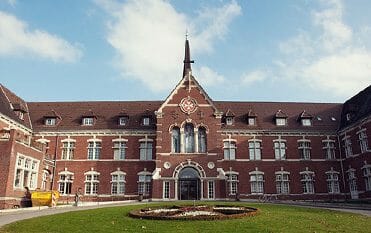After the diagnosis of kidney cancer is made, the type of tumor, the degree of its prevalence are determined, before the treatment of kidney cancer is prescribed, the doctor agrees with the patient what therapeutic steps are required.
Possible treatments for kidney carcinoma:
- Operation
- Targeted drug therapy (“targeted therapies”)
- Immunotherapy
- Radiation therapy (for the treatment of daughter tumors)
What treatment will be carried out in each case especially depends on how far the disease has gone by the time the diagnosis is made. But both the age and the general condition of the patient's body are taken into account when choosing a method of treatment. The most important and decisive treatment for kidney cancer is surgery. The goal of the operation is to remove the tumor completely and thereby cure the disease. However, completely curative surgery is usually possible as long as the tumor is confined to the kidney. If the tumor has already affected the surrounding tissues and lymph nodes or has formed daughter tumors (metastases) in other organs, then the operation often makes sense only in combination with other methods of treatment. In these cases, the treatment of kidney cancer in Germany is primarily carried out using "targeted therapies". Whether these drugs can achieve long-term recovery in kidney cancer is currently in question, although, as a rule, its growth will be slowed down or stopped.
Surgery for renal cell carcinoma is the treatment of choice. With its help, the tumor tissue must be completely removed, and thus the disease is cured. The decision in favor of surgery depends on whether the tumor is limited to the kidney at the time of diagnosis or whether there are already metastases in other organs. The volume of the operation is guided by the stage of the tumor disease. Depending on the size of the tumor and its position, it is currently always attempted to preserve the affected kidney.
Organ-preserving operation
Organ-sparing surgery - removal of the tumor and preservation of the rest of the kidney - with a healthy second kidney brings significant benefits to the operated patient. There are clear indications that patients operated on in this manner are less likely to die of heart disease. The risk of tumor recurrence is not higher than after radical surgery, when the kidney is completely removed. Organ-sparing surgery is necessary when the patient has only one kidney or the second kidney is not working properly. In most cases, this type of surgery is done through a side incision. Laparoscopic removal of the tumor, in which the kidney is preserved, is in principle possible, but can easily lead to complications, especially if the tumor is located in the middle of the kidney. Therefore, this method, regardless of the method used (with or without robotics), is not universally a standard technique. If the tumor can be completely removed and the kidney function is normal, no further treatment is required.
Removal of the affected kidney
For large or unfavorably located tumors, it is still necessary to remove the affected kidney with the surrounding fatty capsule (radical nephrectomy). The approach to the kidney in this case can be carried out through an abdominal incision or a lateral incision. Laparoscopic complete removal of a kidney with a tumor is a standard operation. Such treatment of kidney cancer in Germany is carried out in our clinics in everyday practice. During a radical operation, the lymph nodes located in the immediate vicinity are also removed (radical or regional lymphadenectomy). This is done to accurately determine the extent of the tumor. Extended, called systemic removal of lymph nodes does not make sense. If it is possible to remove the tumor tissue completely, then, as a rule, no further treatment is required. If the tumor is detected at an early stage (tumor less than 7 cm, no lymph node involvement or metastases), the chances of recovery after surgery are relatively good. Most patients after treatment live a long time and can be considered recovered. The remaining kidney, as a rule, takes over the functions of excretion completely.
Active surveillance ("active waiting")
In elderly patients with severe comorbidities, the question arises whether surgery is always necessary, especially if the tumor is very small. Often, the risk of serious damage resulting from surgery is higher than the risk of developing metastases or the risk of dying from the tumor. As a rule, in the elderly, kidney tumors grow very slowly and rather do not metastasize, but exceptions are possible. When making a decision for or against surgery, taking a sample with a biopsy needle (see above) can help. If it turns out that it is a non-cancerous tumor (approximately 10 - 20% cases), the operation may not take place. If, however, cancer cells are found during the sampling, it is necessary to discuss further steps with the patient: whether to carry out the diagnosis and treatment of kidney cancer in Germany in our clinics or limit ourselves to periodic examinations. At the same time, it is possible to agree on regular tumor check-ups (with ultrasound or also with computed tomography), and only perform the operation if the tumor grows rapidly at a rate higher than average and the risk of metastasis increases. This is why we speak of "active" observation: by this we want to express that the operation is avoided at first, but later it may become necessary.
Treatment of kidney cancer with metastases in German clinics
Approximately 10% patients already have lymph node and/or organ metastases at the time of diagnosis. In these cases, only the removal of the affected kidney cannot lead to recovery. However, in most cases, in patients with a good general condition, this operation is performed in order to achieve greater success in subsequent therapeutic measures. In addition, removing the kidney can reduce or prevent tumor-related problems and complications, such as bleeding and pain. The operation also makes sense if only one subsequent system of the body is affected by metastases, for example, the lungs. Then the attending physician will try to remove the daughter tumors after the removal of the diseased kidney during the second operation. In this way, and with kidney tumors with metastases, recovery is fundamentally possible. If the urologist advises this tactic, then the patient will be treated as part of a medical study.
The introduction of so-called targeted drugs that interfere with tumor signaling pathways and thus target malignant tissue is considered a significant step forward in the treatment of advanced localized or metastatic kidney cancer. Growth factors such as VEGF (vascular endothelial growth factor) and PDGF (platelet-derived growth factor) play a decisive role in the occurrence of renal cell carcinoma. They promote the growth of blood and lymphatic vessels, providing the tumor with oxygen and nutrients, thereby making further tumor development possible. In addition, growth factors ensure that the tumor is connected to the circulatory system and spreads to other organs. Stopping growth factors with targeted therapy can stop further tumor growth. The active substances from the group of targeted therapy first of all affect the tumor tissue, while healthy tissue is spared, in general they are relatively well tolerated. Despite this, the attending physician must be well acquainted with the side effects of these medicines, which in some cases can be very harmful.
Sunitinib tyrosine kinase inhibitor
The multi-kinase inhibitor sunitinib is approved for the primary treatment of kidney cancer in Germany for advanced and/or disseminated carcinomas. This decision is based on the results of a large clinical study with a large number of patients, in which it was shown that the active substance can delay the disease process much longer than the immunotherapeutic drug alpha-interferon. Initially, sunitinib is prescribed for favorable prognosis.
Sorafenib tyrosine kinase inhibitor
The multiple kinase inhibitor sorafenib is approved for the treatment of advanced renal cell carcinomas in cases where interferon-alpha or interleukin-2 therapy has failed or patients are not suitable for such therapy. Sorafenib is indicated as "second-line therapy" in case of failure of existing therapy or as "first-line therapy" in certain patients.
Pazopanib tyrosine kinase inhibitor
Pazopanib, also taken orally as sorafenib and sunitinib, is the latest tyrosine kinase inhibitor to be introduced into practice and belongs to the second generation. The indication for its appointment is first-line therapy for low or medium risk. It is possible that this substance has a slightly better side effect profile than both other thyroxine kinase inhibitors. Pazopanib is given to patients in the first place, with a rather favorable prognosis.
Axitinib tyrosine kinase inhibitor
And axitinib can be taken in tablets. This latest approved targeting agent against renal cell carcinomas can be used when sunitinib or cytokine therapy has failed. As with everolimus, this is a second-line therapy.
Temsirolimus mTOR inhibitor
Temsirolimus, an mTOR inhibitor, is the next active ingredient in a targeted therapy group that has been shown to be effective in the treatment of kidney cancer in Germany in our clinics. It is approved as a first line treatment for advanced renal cell carcinoma in patients with a poor prognosis. The basis for the approval was the results of a large clinical study showing that, compared with standard interferon alpha therapy, it leads to a significant life expectancy advantage. Temsirolimus is given intravenously.
Everolimus mTOR inhibitor
This substance is taken orally, approved for second-line therapy after treatment with an ami tyrosine kinase inhibitor (see above). Its rational purpose is in the possible formation of tumor resistance against angiogenesis inhibitors, probably by creating new signaling pathways or increased infiltration of tumor cells into a healthy environment to overcome the lack of substrate caused by therapy. The tolerance of this substance appears to be relatively good.
Bevacizumab monoclonal antibodies
The monoclonal antibody bevacizumab is also directed against specific growth factor (VEGF) and is approved in combination with interferon (IFN-alfa) for first-line therapy. Bevacizumab is administered intravenously, while IFN-alfa is administered subcutaneously. Currently, this combination is prescribed primarily for patients with a rather good or not very bad ("average") prognosis.
With immunotherapy, the fight against cancer cells must be supported by the body's own immune system. In the last 20 years, alpha-interferon and interleukin-2, two signal substances of the immune system, have entered the practice. They activate the cells of the immune system and thus inhibit the growth of malignant cells. The combination of both of these substances in a small proportion of patients can achieve regression of the tumor or arrest of metastasis. In isolated cases, it was possible to live without illness for many years. The condition for the possible success of immunotherapy was, as a rule, the surgical removal of the kidney tumor. Immunotherapy with these substances, in general, did not live up to legitimate expectations.
The treatment of kidney cancer in Germany with the use of radiation therapy is aimed at destroying cancer cells. In case of renal cell carcinomas insensitive to radiotherapy, irradiation is carried out only at advanced stages for the treatment of metastases. It serves primarily to reduce complaints and pain. Recovery from a tumor disease with the help of radiation therapy is impossible.
If a tumor disease appears again (local recurrence), then, if possible, another operation is performed. The attending physician discusses with the patient the advantages and disadvantages of the new operation. In the case of the formation of metastases in other places, it is necessary to decide whether they can be removed surgically. In some cases, such surgery may make sense and lead to a long tumor-free life. In other cases, the issue of drug forms of treatment (targeted therapy, immunotherapy) is being decided.
In very elderly patients suffering from tumor-related bleeding and in whom surgery cannot be performed due to severe comorbidities, so-called tumor embolization is possible. In this case, the blood vessel (renal artery) going to the kidney will be closed with a catheter. Due to the lack of blood supply, the tumor may not grow further or even regress. However, the effect of such manipulation is purely palliative and most often not for a long time. Also, the treatment of kidney cancer in Germany is carried out by another, less invasive method - RITA. In Germany, sufficient experience has been accumulated in carrying out the so-called radiofrequency ablation of the tumor (RITA). With this method, a special wire is passed through the skin into the tumor, then high-frequency energy destroys the tumor by thermal action. It is expected that in the future in many cases, especially in very elderly patients, a decision will be made in favor of conservative tactics.
Video
Request appointment
Useful links















